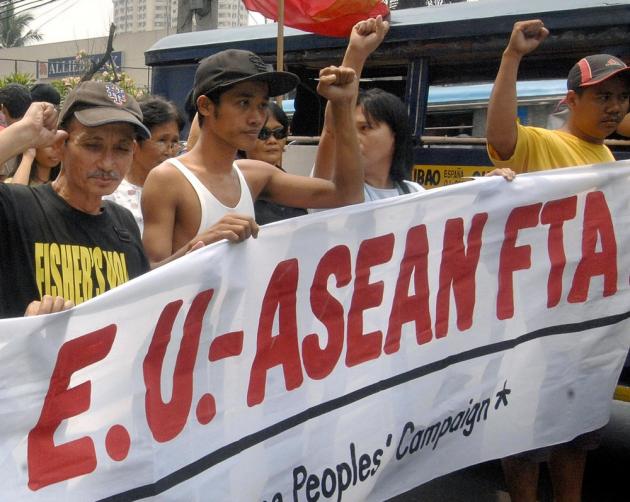No time to lose on FTA with EU: Thai ministry

Asia News Network – Sat, Dec 1, 2012
No time to lose on FTA with EU: Thai ministry
By Piyanart Srivalo in Bangkok/The Nation
Bangkok (The Nation/ANN) — Thailand’s Commerce Ministry is rushing to get Cabinet’s endorsement of the draft Thai-EU free-trade agreement (FTA) on Tuesday in a bid to maintain the Kingdom’s attractiveness in terms of trade and investment, as well as to prepare for the end of European Union privileges under the Generalised System of Preferences (GSP).
The ministry is also building public support for participation in negotiations to join the Trans-Pacific Partnership (TPP), a type of FTA involving 11 countries in the Asia-Pacific region including the US.
In a copy of the draft Thai-EU FTA obtained by The Nation, the Commerce Ministry reasons that the Kingdom needs to move fast on the pact, as the EU has started bilateral negotiations with Asean members Singapore, Malaysia and Vietnam. Indonesia and the Philippines are also preparing for negotiations, while Thailand has not yet submitted its official agreement.
This agreement will ensure a marketplace for Thai exports, particularly once Thailand graduates from the GSP programme in 2015, it says.
The GSP allows special export quotas for developing countries to the EU, primarily to strengthen the exporters’ competitiveness.
"If FTAs with other Asean nations are completed, Thailand will be left out. Moreover, Thailand faces the possibility of graduating from the GSP programme in 2015, whereby all tariff privileges would be revoked," the ministry said.
"At present, Thailand’s products exported to the EU under the GSP programme are valued at 297 billion baht (US$9.6 billion) or 38.40 per cent of total exports to the continent. Without the privileges, 84.8 billion baht could be shaved off the value."
Parliament in 2007 approved the draft agreement, but it was cancelled as Thailand and other Asean nations decided to formulate an FTA with the EU as a group. However, negotiations stalled in 2009 on differing opinions on market opening and development scale among Southeast Asian nations and between Asean and the EU.
Much of the impact of an FTA would be felt by exporters of air-conditioners, automobiles, shoes, frozen shrimp, shrimp-based seasoning, ready-to-eat foods, rubber gloves and vehicle tyres.
"The FTA with the EU would establish a permanent GSP and would increase Thailand’s competitiveness. Unless we hurry, our competitiveness in trade and investment will decline from 2015 onwards," the ministry said.
The FTA would also be expected to boost European investment in Thailand and vice versa. In 2011, investment from Europe in Thailand totalled 100 billion baht, making it the second-biggest foreign investor after Japan. From 2002 to 2011, 1,105 projects from Europe won investment tax privileges in Thailand, with combined investment of 482.57 billion baht.
The Thai-EU FTA would cover agreements in trade of goods and services, investment and economic cooperation in 17 areas.
Study by the Thailand Development Research Institute indicates that Thailand would reap maximum benefits if the sensitive-goods list were kept to a minimum.
On the plus side, the TDRI showed that automobiles, rice, frozen shrimp, tapioca and unpolished rice would be among the exports to benefit from the trade pact. Construction and retail companies would witness higher business volumes.
Meanwhile, Thailand would be an attractive investment destination for Europe.
On the negative side, TDRI foresees a reduction in customs duty, which could be addressed by an increase in value-added tax. In the short term, trade deficits would widen, but thanks to rising output, this would lead to a trade surplus in the long term.
Negative impacts are foreseeable for some products such as skimmed milk, whisky, household items, jewellery, chemicals, rubber, plastic products, electronics and wood products.
To ease the impacts, the TDRI suggested the establishment of a compensation fund to help affected business operators, as well as loan guarantees for operators and farmers. Thailand also needs to offer investment tax allowances to product-testing labs; improve the information-technology system; and enhance small business operators and farmers, it said.
Speakers at an Economic Reporters Association seminar yesterday also encouraged the government to move ahead with the TPP negotiations. Ratchada Jiasakul, senior manager of Bryan Cave Thailand, said that if Thailand opted out of the negotiations, negative impacts were foreseeable on economic growth and the supply chain.
Foreign investors would move to neighbouring countries for greater benefits. Thailand must prepare for the intellectual-property provisions, particularly involving drug patents, Ratchada said.
US$1 = 30.7 Thailand baht





